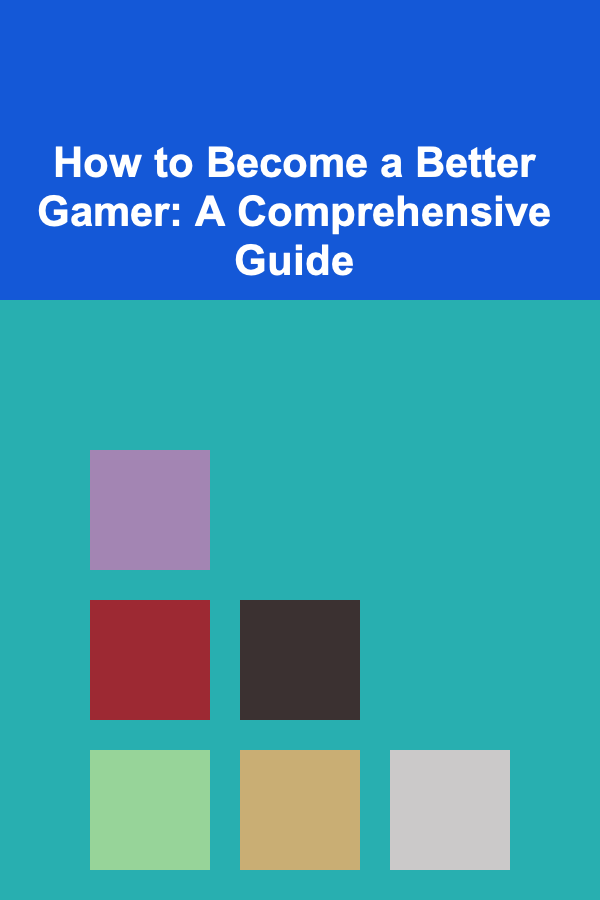
How to Become a Better Gamer: A Comprehensive Guide
ebook include PDF & Audio bundle (Micro Guide)
$12.99$8.99
Limited Time Offer! Order within the next:

Gaming has evolved into one of the most popular forms of entertainment in the world today. Whether you're an aspiring esports competitor, a casual player, or someone who simply enjoys gaming as a hobby, the pursuit of becoming a better gamer is universal. Everyone wants to perform at their best, whether that means climbing the ranks in competitive multiplayer games, achieving high scores in solo campaigns, or mastering complex mechanics. But how do you go from being an average gamer to one who consistently excels? This comprehensive guide explores the essential components of gaming improvement, from physical skills to mental strategies, with tips and techniques for players of all levels.
Understanding the Fundamentals of Gaming
Before you can improve as a gamer, you must first understand the fundamental elements that constitute a game. Every game, whether it's a battle royale, a strategy game, or a first-person shooter, has a unique set of rules, mechanics, and objectives that you need to learn in order to perform well.
1.1 Mastering Game Mechanics
Every game has its own mechanics that form the basis for all player actions. For example, in a game like Fortnite , the mechanics revolve around building, aiming, and movement, while in League of Legends, the core mechanics are about positioning, timing, and team coordination. To become a better gamer, start by identifying the key mechanics in the game you are playing and spend time practicing these skills until they become second nature.
- Movement: Whether it's sprinting in an open world game, dodging in a fighting game, or positioning in an MMO, the ability to control your character is essential.
- Combat: This includes aiming, shooting, dodging, attacking, and blocking. The speed and precision with which you perform these actions directly impact your performance.
- Timing and Coordination: Games often require perfect timing, such as in rhythm games or games with combo attacks. Understanding when to act is just as important as how to act.
1.2 Learning the Game's Objectives
Every game has a goal, whether it's defeating an enemy team, completing missions, or collecting resources. Understanding the objectives of your game, both short-term and long-term, is vital to improving. If you're playing a competitive game, your primary objective may be winning. However, in single-player games, your objectives could range from story completion to achieving high scores. Clarifying what needs to be done allows you to focus your efforts and better direct your practice.
Developing Your Skills
Once you've mastered the basics of the game mechanics and objectives, the next step is improving your in-game skills. Becoming a better gamer involves continuously refining various abilities---technical, cognitive, and strategic.
2.1 Improve Your Reflexes and Aiming Skills
In many competitive games, particularly first-person shooters (FPS), your reflexes and ability to aim accurately are crucial. Here are some tips for improving your reflexes and accuracy:
- Use Aim Training Tools : Many FPS players use aim training programs like Kovaak's FPS Aim Trainer or Aim Lab to hone their aiming accuracy. These tools allow you to practice tracking, flicking, and precision aiming under various conditions.
- Adjust Your Sensitivity: Finding the right mouse or controller sensitivity is essential. Too high, and your movements become erratic; too low, and you're slow to react. Experiment with settings until you find what works best for you.
- Warm Up Before Playing: Just like any sport, warming up is important. Spend 10-15 minutes before playing, aiming at targets and practicing movements. This ensures that your reflexes are sharp when you jump into real matches.
2.2 Work on Your Communication Skills
In multiplayer games, especially those that require teamwork like Overwatch , Dota 2 , or Call of Duty, effective communication is vital for success. Whether you're playing with friends or random teammates, being able to convey information clearly and listen to others can make a huge difference in the outcome of a game.
- Use Voice Communication: Many games offer voice chat, which is often the quickest way to convey critical information. If you are playing a team-based game, make sure your microphone is set up correctly and that you use it to call out enemy positions, share resources, or call for assistance.
- Keep Your Communication Constructive: Negative communication, such as blaming teammates or getting angry, can hurt team morale. Encourage and provide positive feedback to your teammates, even when things go wrong.
- Strategize with Your Team: Beyond simple communication, you should actively participate in strategic planning. Discuss objectives, roles, and tactics before, during, and after matches.
2.3 Improve Your Game Sense
"Game sense" refers to your ability to make decisions based on your understanding of the game. In multiplayer games, this includes understanding the map, knowing the locations of opponents, anticipating enemy actions, and planning your next move based on the information available. Improving your game sense requires constant practice and an analytical mindset.
- Map Knowledge: Learn every map in your game. Understand choke points, safe zones, ambush spots, and item spawn locations. This will help you predict enemy movements and plan your strategy accordingly.
- Study Professional Play: Watch professional players in your game of choice. They provide a wealth of knowledge regarding positioning, tactics, and how to think several steps ahead.
- Be Aware of Timing: Timing is crucial in many games. Know when power-ups respawn, when objectives are available, and when enemies are likely to strike. This gives you the edge in making better decisions.
Mental Training: Building Focus and Patience
Becoming a better gamer is not just about physical skills; it's also about having the right mental attitude. Mental toughness and focus can make a significant difference in your performance.
3.1 Build Mental Resilience
Gaming often involves long periods of focus, intense competition, and moments of failure. To become a better gamer, you must develop mental resilience to overcome frustration and keep pushing forward.
- Learn from Your Mistakes: Losing a match or failing a mission can be disheartening, but it's an opportunity for growth. Analyze what went wrong, and use it as a learning experience to improve for next time.
- Stay Calm Under Pressure: In high-stakes moments, your ability to stay calm can make or break your performance. Focus on controlling your breath and slowing down your decision-making process to avoid panicking.
3.2 Manage Your Tilt
"Tilting" refers to a state of frustration that negatively impacts your gameplay. Tilt can lead to poor decision-making, erratic behavior, and more losses. Here's how to manage tilt:
- Take Breaks: If you're feeling frustrated or angry, step away from the game for a few minutes. This allows your emotions to settle, helping you return with a clearer mind.
- Maintain a Positive Mindset: Reframe losses and mistakes as opportunities to improve. A positive mindset allows you to remain focused on the process of becoming a better gamer rather than being fixated on the results.
3.3 Stay Focused and Avoid Distractions
One of the most important mental skills in gaming is the ability to focus. Whether you're playing in a tournament or casually grinding, distractions can hurt your performance.
- Limit External Distractions: Try to create a gaming environment where distractions are minimized. This might involve turning off notifications on your phone or setting up a quiet, dedicated gaming space.
- Stay Present: Be fully engaged in the game. Avoid thinking about past mistakes or future outcomes. Focus only on the current game and what needs to be done in the present moment.
Physical Training: Enhancing Your Reaction Time and Stamina
Gaming isn't just a mental exercise---it's also a physical one. While you don't need to be an athlete to be a top gamer, keeping your body in good condition can improve your reaction time and endurance, both of which are essential for long gaming sessions.
4.1 Improve Your Hand-Eye Coordination
Hand-eye coordination is crucial for precision and speed, particularly in FPS games or rhythm-based games. Exercises like playing reaction-based games, hand exercises, or even sports can improve coordination and reflexes.
- Practice Hand-Eye Coordination: Engage in activities like juggling or playing fast-paced games to enhance your hand-eye coordination. There are even mobile apps designed specifically to improve reflexes and coordination.
4.2 Physical Fitness for Endurance
Gaming can require long hours of focus, especially in competitive gaming or marathon sessions. Physical fitness plays a significant role in maintaining stamina and preventing fatigue.
- Cardiovascular Exercises: Engage in cardio activities like running, swimming, or cycling to build stamina and endurance.
- Strength Training: Building muscle through strength training can help prevent repetitive strain injuries that come from extended gaming sessions, such as carpal tunnel syndrome.
- Stretching and Posture: Regular stretching exercises and maintaining good posture can prevent long-term injuries and help you stay comfortable during gaming marathons.
Tactical and Strategic Thinking
At its core, gaming is about strategy---whether you're managing resources in an RTS, planning moves in a strategy game, or coordinating with teammates in a MOBA, your success often depends on how well you think ahead and execute your plan.
5.1 Study Strategy Guides
Strategic games often come with complex mechanics that require careful planning. To improve your strategic thinking:
- Read Strategy Guides: Many games have online communities that create detailed guides and tutorials. Learning from others' experiences can help you understand different strategies and counter-strategies.
- Analyze High-Level Plays: Watch replays of high-level players or esports professionals to gain insights into their decision-making and strategies.
5.2 Be Adaptable
While it's essential to have a plan, it's also crucial to adapt to changing circumstances. A rigid strategy can lead to failure when things don't go according to plan. Always be ready to pivot based on the game's evolving dynamics.
- Learn to Adapt: If an initial strategy isn't working, don't be afraid to try something new. Adapt your playstyle to fit the current situation in the game.
Conclusion
Becoming a better gamer is a multifaceted process that involves continuous improvement in both technical and mental areas. Mastering game mechanics, improving your reflexes, developing communication skills, and building mental resilience are all essential components of gaming excellence. In addition, physical fitness and strategic thinking are vital for long-term success.
Improvement in gaming doesn't happen overnight, but with dedication, practice, and a willingness to learn, you can significantly enhance your skills. Keep challenging yourself, stay positive, and enjoy the process of becoming the best gamer you can be.
Reading More From Our Other Websites
- [Organization Tip 101] Why Creating a Cozy Nook Can Improve Wellbeing
- [Home Family Activity 101] How to Start a Family Sports Day Tradition
- [Hiking with Kids Tip 101] Adventure Awaits: The Best Parks for Teaching Kids the Basics of Hiking
- [Home Soundproofing 101] How to Use Rugs and Carpets for Soundproofing Your Floors
- [Organization Tip 101] How to Organize a Fundraising Event with Impact
- [Personal Care Tips 101] How to Choose a Shampoo for Thick, Coarse Hair
- [Horseback Riding Tip 101] Common Mistakes New Riders Make---and How to Avoid Them
- [Home Maintenance 101] How to Keep Your Hot Tub and Spa Sparkling: A Comprehensive Care Guide
- [Personal Care Tips 101] How to Reduce Sugar Cravings Effectively: A Comprehensive Guide
- [Organization Tip 101] How to Maintain Document Security in Shared Spaces

How to Create a Passive Income Stream from Real Estate Investment
Read More
How To Discover Breakthroughs in Bone Regeneration
Read More
How to Find a Mentor: Tips for Career Growth
Read More
How to Manage Your Finances When You Have Multiple Streams of Income
Read More
How to Use SMS Automation for Upselling During Abandoned Cart Recovery in Dropshipping
Read More
How To Plan for Philanthropy in Your FIRE Plan
Read MoreOther Products

How to Create a Passive Income Stream from Real Estate Investment
Read More
How To Discover Breakthroughs in Bone Regeneration
Read More
How to Find a Mentor: Tips for Career Growth
Read More
How to Manage Your Finances When You Have Multiple Streams of Income
Read More
How to Use SMS Automation for Upselling During Abandoned Cart Recovery in Dropshipping
Read More